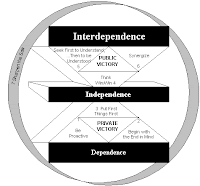Seven Good Habits
What do you want to be when you grow up? That’s an appropriate question for a middle aged man on his birthday. Of course, I can only consider myself to be middle aged if I plan on being 106 one day.
For the follower of Christ the goal is to be more like him every day. But by whose strength and by which method can this be accomplished? I have belabored the first part of this question in the will & grace blogs. Maturity may only be achieved through God’s power; my will, emotion, and intellect are insufficient to the task. So, lets discuss the latter part of the question; if we accept that it is God’s work then how does it happen and how do we participate. The answer will include making a habit of saying yes to God’s work within.
Many years ago Stephen Covey influenced me a great deal. I read his “Seven Habits of Highly Effective People” and then took a course on the topic. I later became a trainer for Covey Leadership and enjoyed learning from Dr Covey and teaching the principles he had described to Educators and Business people around the country. Stephen is a devout member of the LDS church, so while his first allegiance is not to the bible or to the Jesus I know, the principles are timeless.
The “Seven Habits” were defined through study of people who demonstrated success in both personal and interpersonal mastery. Personal mastery can be described as the practice of being proactive and healthy in making and keeping promises to self and others. Interpersonal mastery involves a servant leadership attitude in communication, decision-making, and cooperation. These principles had a profound effect on my ability to focus on what is important, to get the right stuff done, and to leave the lives I encounter better than I found them. Here is a brief description of the habits:
1.<strong>Be proactive</strong>. Rather than being reactive and blaming others for my behavior I am intentional about taking responsibility and choosing a response that will build rather than tear down.
2.<strong>Begin with the end in mind.</strong> Identifying our personal mission and goals.
3.<strong>Put first things first</strong>. Setting our actions on our priorities through time management.
4.<strong>Think win/win</strong>. Valuing others enough to look for alternatives where all parties succeed
5.<strong>Seek first to understand, then to be understood</strong>. This is both and attitude and a skill fo listening deeply for complete understanding.
6.<strong>Synergize</strong>. Exploring and valuing differences and differing perspectives to cooperate and create in community
7.<strong>Sharpen the saw</strong>. The habit of renewal where activity and time is focused on staying healthy mentally, emotionally, physically, and spiritually.
These habits have been put to good use in my life and have pushed me to be more organized, get stuff done, improve as a communicator, and make progress toward leaving a worthwhile legacy. I value them and I commend them to you. I can even give you verses to support each of them with biblical wisdom, just ask me.
The problem is that they are not enough. On their own they are an exercise in personal disciple. Recently Matt Chandler spoke of this type of thing as behavior modification and warned against the pride that can come of it. Someone else has said that habits are just ruts we get into; and that a rut is just a grave with the ends kicked out. So you could say that personal discipline of this type can help you to make ruts on higher ground. This is fine if you are working on a human destiny; it will help you to run faster and jump higher. But you were meant to fly.
